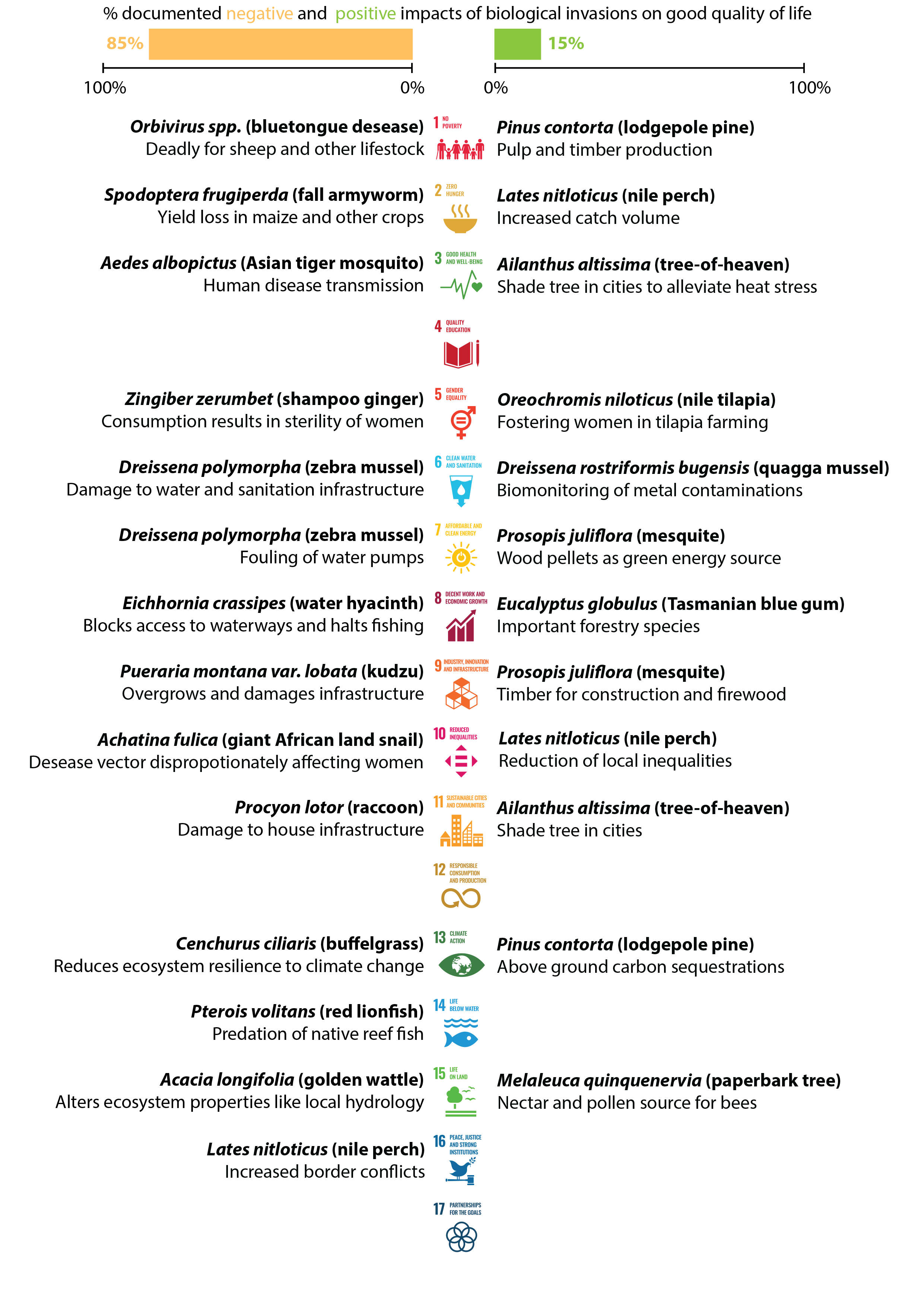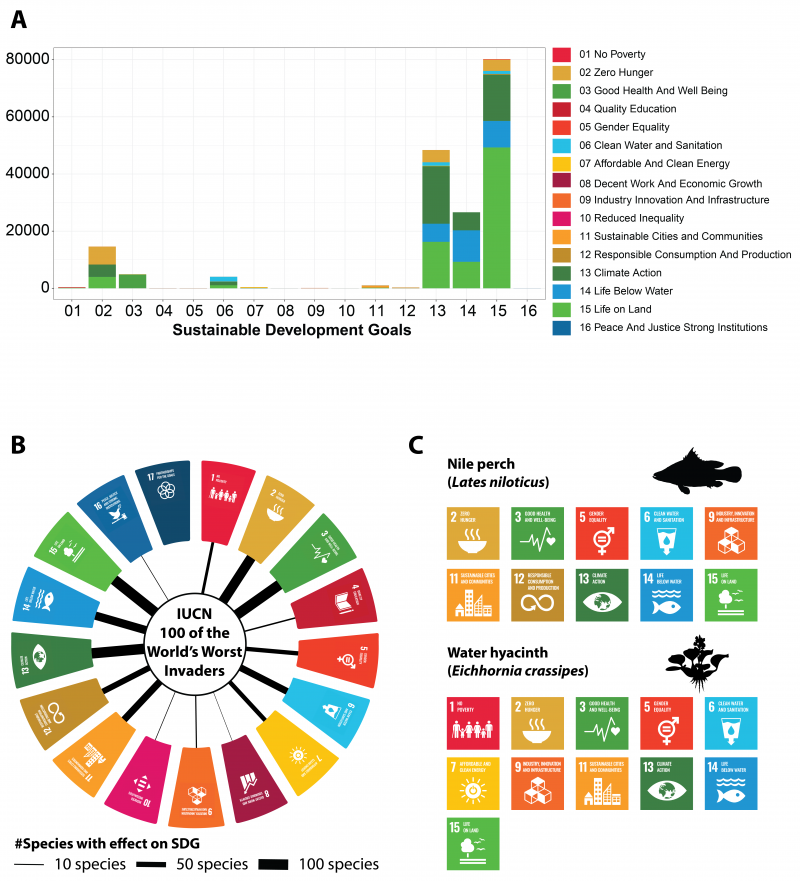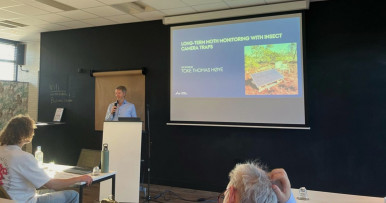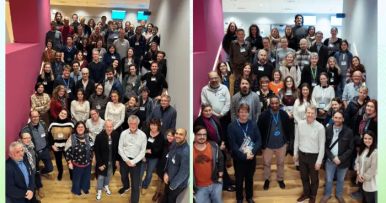The neglected importance of managing biological invasions for sustainable development
Authored by Helen Roy from the UK Centre for Ecology & Hydrology and the University of Exeter; and Bernd Lenzner from the University of Vienna.
The commitment of nations to the Kunming-Montreal Global Biodiversity Framework and the UN Sustainable Development Goals is critical to addressing environmental issues and ultimately bending the curve of biodiversity loss. Invasive alien species are acknowledged as one of the major causes of biodiversity loss and on islands are considered the leading cause of biodiversity declines. Indeed, 60 percent of all global extinctions have been caused either solely by invasive alien species or by invasive alien species acting alongside other global change drivers including climate change. Target 6 of the Kunming-Montreal Global Biodiversity Framework acknowledges the threat of invasive alien species and calls for nations to “Eliminate, minimize, reduce and or mitigate the impacts of invasive alien species on biodiversity and ecosystem services by identifying and managing pathways of the introduction of alien species, preventing the introduction and establishment of priority invasive alien species, reducing the rates of introduction and establishment of other known or potential invasive alien species by at least 50 per cent, by 2030, eradicating or controlling invasive alien species especially in priority sites, such as islands.”
The recent recommitment of the UN Global leaders to the United Nations (UN) Agenda 2030 on Sustainable Development and aligned Sustainable Development Goals is encouraging. However, biological invasions are an underestimated driver of the biodiversity crisis (Roy et al. 2024[HR1] ) and their relevance to the Sustainable Development Goals is often overlooked. Invasive alien species have impacts on nature, nature’s contributions to people and good quality of life with evidence for some species of impacts spanning all three categories. As an example, invasive ants can disrupt the ways in which ecosystems function and can inflict stings that are detrimental to human health. Target 15.8 within Sustainable Goal 15 “Life on Land” includes biological invasions stating: “By 2020, introduce measures to prevent the introduction and significantly reduce the impact of invasive alien species on land and water ecosystems and control or eradicate the priority species”. However, this target does not recognise the many impacts of invasive alien species relevant to sustainable development that go beyond the environment.
Bernd Lenzner, OneSTOP project team member, recognised the lack of emphasis on biological invasions within the UN Agenda 2030 on Sustainable Development and noted that this shortfall is a major concern given the growing global threat of biological invasions. Convening a team that represents other project partners from OneSTOP, Bernd assessed the available literature to illustrate how biological invasions are discussed within the context of the UN Agenda 2030 on Sustainable Development. The outcomes of the review supported our concerns and showed that discussions on biological invasions within the context of the Sustainable Development Goals focus mainly on SDG 15—Life on Land, SDG 13—Climate Action and SDG 14—Life Below Water, so particularly the goals associated with the environment. However, impacts on goals associated with societal progress, health and economy are seldom considered. By mapping the association of invasive alien species against all of the Sustainable Development Goals, the research team illustrates the relevance of the effects of invasive alien species beyond just the environment-focused Sustainable Development Goals and proposes a set of actionable ways forward.
So what can be done?
-
Acknowledge the role played by biological invasions across all the Sustainable Development Goals of sustainable development and that the successful implementation of the Agenda 2030 will depend on the commitment of everyone to prevent and manage them.
-
Strengthen the connections among international agreements and conventions by, amongst other actions, including standardised, open data sharing, increased information exchange and coordination to maximise synergies and increase efficiencies in resource allocation.
-
Improve monitoring to inform relevant indicators that span the biological invasion process and encompass impacts alongside the introduction rate, spread and distribution of alien species but also capture information on the effectiveness and fairness of policy and management.
We are excited that OneSTOP will provide underpinning evidence and tools to deliver these critical actions.
Within OneSTOP’s WP6, we focus on the implementation of the EU Regulation 1143/2014 on IAS that gives a framework under which to integrate biosecurity measures, considering policy integration across sectors, including policy on trade, physical infrastructure and environmental legislation. The SDGs also play a crucial role in these considerations, as the European states have committed to their national implementation by 2030. Hence, strengthening the role of IAS in sustainable development also benefits OneSTOP in identifying potential barriers and proposing strategies for policy engagement and regulatory compliance. We will particularly be looking for inconsistent or inadequate regulations, limited enforcement capacity, and a lack of harmonisation across different jurisdictions.
Furthermore, through the Living Labs, we will be engaging people in understanding the threat of invasive alien species and testing monitoring approaches to inform management and ultimately mitigate the impacts of invasive alien species. Open data sharing is at the core of OneSTOP and we will be developing workflows to maximise the interoperability and rate of data flow. Over the next three years, we will be working collaboratively to ensure that biological invasions are recognised more broadly within the context of sustainable development and at the heart of global commitments alongside climate change and other major drivers of biodiversity loss.

Conceptual figure SDG IAS
Publication
Lenzner B, García‐Rodríguez A, Colling G, Dullinger S, Fugger J, Glaser M, Hennenfeind JH, Kaplan E, Liu D, Omer A, Pauchard A, Roy HE, Schernhammer T, Schertler A, Stoett P, Tedeschi L, Vorstenbosch T, Wessely J, Essl F (2024) The neglected importance of managing biological invasions for sustainable development. People and Nature 6: 1804–1811. https://doi.org/10.1002/pan3.10712



